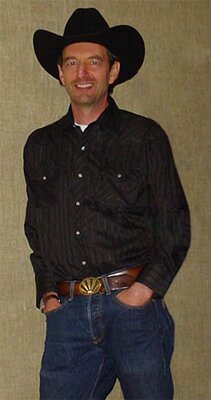Welcome to the “My Place” page
 My name is Scott My name is Scott
I run the Rope and Wire website.
My original idea for this page was to give those living in the country the opportunity to tell others about the things that made their farm or ranch so special.
Well, I’ve come to the conclusion that either no one likes to brag or no one lives on a farm or a ranch. Whatever the case, no one submitted an article so I felt it was high time to try something different.
So for now this will be literally “My Place.” I’ll use this page to post a western blog or short articles. They will either be mine, or possibly one from a contributing R&W community member.
The theme will remain Western but the content will change weekly, or there about.
If you click on any of the links to past blog's, you can return to this page by clicking on the My Place button across from my picture.
I hope you enjoy it but if not, might I suggest you “stroll the grounds.” Read a story or watch a movie.
Thanks for visiting.
Scott
Wheels West
Where would we be without the wheel?
On the list of most important inventions, if there is such a list, I think the wheel would probably be at the top as the single most important invention… ever.
I’m sure there are some who would beg to differ with me on this. I’ve heard there are many fine bakers out there who believe sliced bread should be at the top of that list.
Since the very first wheel came into being, there have been men dedicated to building, repairing and improving upon it. So much so that the making of a wheel evolved into more of an art form than just a simple manufacturing process and those who were dedicated to this art eventually became known as wheelwrights.
Wheelwrights were highly skilled professionals. Their trade was not taught in schools. Their knowledge was handed down to them from mentors and their skills were learned through trial, and years of hands on experience.
By the time wooden spoke wheels came onto the scene, a wheelwright needed to have a significant knowledge base. He needed to have an awareness of the different species of wood available to him and the understanding of the specific properties of each of these species. How each performed under different conditions and situations were mandatory. His understanding of basic engineering was essential and the necessary skill and expertise of the many specialized tools needed to create the finished product was extremely important.
Good quality wheels that didn’t split, break or just plain fall apart was expected and the harsh conditions, under which they were subjected, demanded it.
Not only did a wheel need to be perfectly round, (that’s a given) it also needed to have such things as the correct taper and dish to make the wagon it was mounted to run true. It also needed to hold the weight of a wagon filled with goods as well as withstand the strain placed upon it as it rounded a curve in the road or rolled across rough and uneven terrain along the trail. No matter how good it looked, if it wasn’t built correctly, the wheel could easily collapse or the hub could wear excessively and unevenly against the axel it was mounted on.
Wheelwrights were a major factor in this countries Westward expansion. In fact, many of the wagon trains heading west employed wheelwrights to travel along with, and maintain the wheels of the wagons in their party. Some of the finest wood spoke wheels to ever leave their mark across this countries prairies, plains and mountains were made by the likes of Lewis Downing and Joseph Murphy, two extremely talented men behind the Concord stagecoach and J. Murphy wagons, of which the remnants of their passing can still be seen today in many places along the Mormon, Santa Fe and Oregon trails just to name a few.
Building a quality wood spoke wheel was, and still is, an art form like no other.
|